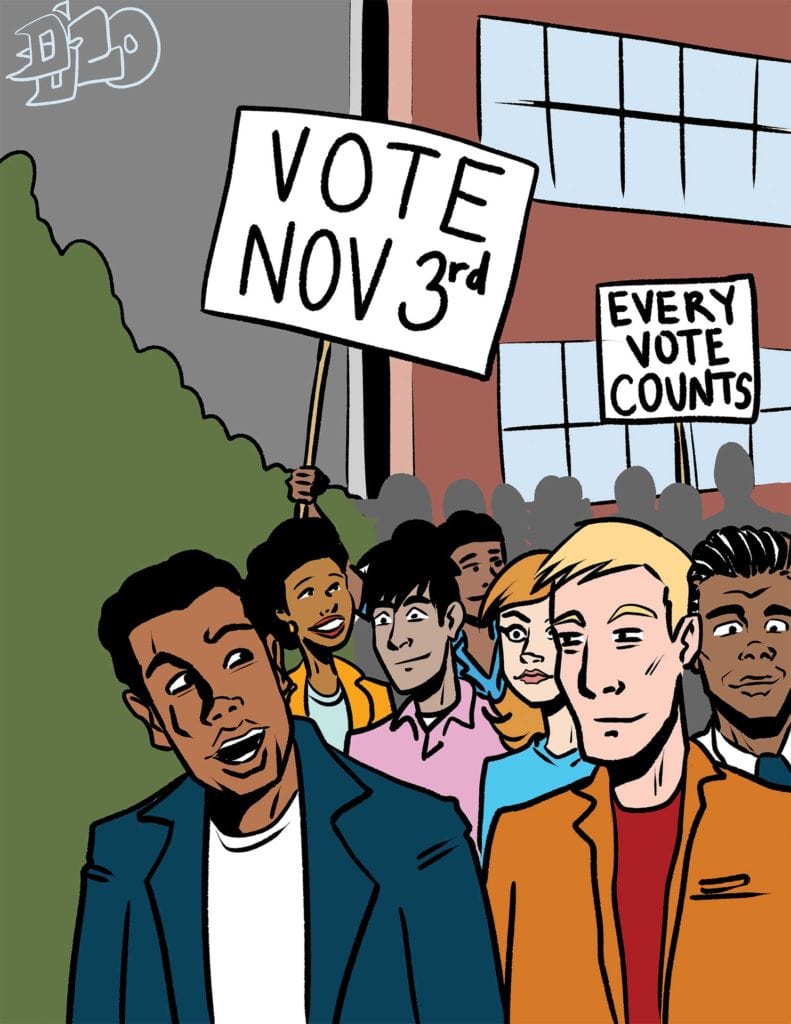
Votes and money are the only sources of secular power in the United States. Racial discrimination has greatly impeded the ability of Blacks to acquire an equitable amount of the latter. From the founding of the nation, there has also been a strategy to minimize the voting power of Blacks. An overwhelming turnout for Joe Biden at the polls on Nov. 3 will establish irrevocably that Black lives matter, and Blacks will continue to flex their political muscle.
In the very beginning, the Founding Fathers of this nation never intended to allow universal suffrage. When the Constitution was approved by the Continental Congress in 1787, women, slaves, white men without property and Native Americans were all denied the right to vote. The Founding Fathers well understood that the power in a democratic republic is held by the voters.
In addition to denial of the right to vote, Blacks had a number of other abuses to combat. At the top of the list was slavery, followed by segregation and racial discrimination. Since slavery was so morally indefensible, especially to wealthy Americans who did not live in agricultural states where slave labor was needed, the termination of slavery became a national issue. The 13th Constitutional Amendment that rendered slavery illegal was ratified in 1865.
However, a Black man did not automatically acquire the right to vote once he was no longer a slave. Every state has the right to establish rules for voting. Paul and John Cuffee, two wealthy Black freemen in Massachusetts, induced the state to allow Blacks to vote by asserting in 1810 that there could be no taxation without representation. This is the same charge that was brought by the colonists against the British.
The 14th Amendment, ratified in 1868, gave U.S. citizenship to everyone born here, even former slaves, and the 15th Amendment, ratified in 1870, gave every male citizen the right to vote regardless of his race or color. Nonetheless, during Reconstruction and for a century thereafter, many states of the Old Confederacy refused to grant Blacks voting rights because they outnumbered the whites. According to the 1860 Census, Blacks were 58.6% of the South Carolina population, 55.3% in Mississippi and 49.5% in Louisiana.
The U.S. Supreme Court ruled in the case of Plessy v. Ferguson in 1896 that racial segregation was legal as long as the separate facilities were equal. So coming into the 20th century, Blacks were still victims of racial segregation and racial discrimination, as well as disenfranchisement in Southern states.
However, the 20th century was momentous for some other groups. In 1920, the 19th Amendment to the Constitution gave the right to vote to female American citizens, and in 1924, the Indian Citizenship Act gave citizenship and the right to vote to Native Americans who were born in the U.S.
Later in the century, civil rights lawyers and equal rights protesters achieved substantial gains in the status of Blacks. The case of Brown v. Board of Education (1954) established the illegality of racial discrimination in public schools. The case also questioned the general legality of racial segregation. The Civil Rights Act of 1964 outlawed racial discrimination in employment, education and places of public accommodation.
Then, the Voting Rights Act of 1965 imposed severe regulation on the voting process in those states that had been guilty of racial discrimination in voting. There has been persistent opposition by bigots to procedures prescribed by the government in those states that are affected.
The present occupant of the White House is fully aware that the power of a committed Black vote will oust him from office. Expect that he will implement every possible dirty trick in order to win reelection.
Past election results indicate that Black women have reliably voted overwhelmingly for the Democratic candidate for president. This time, Black men must vote en masse and not be conned or misled. The incumbent is an enemy, posing as a friend.
Vote for Joe Biden for president and take your friends and family to the polls.






